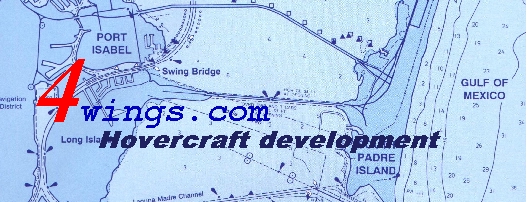|
Welcome
to Hovercraft designs!
In the following pages you won't find the blueprints for the british
Hover ferry but links to several new or outstanding Hovercraft
designs.
All Hovercraft or surface effect vehicle are designed on common rules.
Minimum weight, maximum strength, well balanced with the center of
gravity
just a little bit aft the centerline of the craft.
Quite big surface for the given payload (to hold cushion pressure low)
and a skirt around the outer perimeter of the craft to hold the
pressure
under the craft.
But this does not mean that all surface effect vehicle have to look
alike.
From Hovercraft which can circle around a peanut to high speed yacht
tender - you will find a multitude of design variations from different
designer.
We will feature different craft from time to time as the information
from the designers comes in our mailbox.
Pass by often and do not forget to tell your friends.
Design outlines for
4wings
- Hovercraft.
These design outlines are just for our
project's
and crafts - and every daredevil can skip them. Even if we believe you
should hold them in mind if you build your own craft.
Our background is extensive cruising in the
Golf
of Mexico region - 3 hurricanes and 7 tropical storms aboard our
catamaran
"Water-bug". After all this wet history, we are mostly concerned about
the safety of a water craft - Hovercraft or sailboat does not make any
difference in a squall.
But we want to mention here that we are
into
cruising Hovercraft and not racing.
Flotation :
A water craft shall have adequate flotation
to
hold itself and the passengers under all conditions a
float.
This positive flotation shall be in form of fixed foam ( Panels,
injected
or poured) .
The craft shall have on the bottom places
to
grab on / hold yourself to the craft for the purpose of rescue.
Cockpit:
The cockpit on an open craft shall be self
draining
or equipped with a self draining system, allowing spray to run of
without
getting the craft ashore. It shall be under max. payload above sea
level
- outlets should have adequate diameter to drain the area. Safety gear
should be easy accessible for all passengers.
On closed crafts should be at least one
self
draining outlet, for cases like broken windshield.
Safety equipment:
All crafts should be equipped with current
safety
and navigation equipment after US Coast Guard standard for small
crafts.
Navigation lights or at least 360 degree strobe light are built
in
the electrical system of the craft.
Structural parts:
All structural parts should be sealed with
resin
against rot. Engine mounts should be connected to the main frame of the
craft - as ducts should be laminated to give driver and passenger
safety
in case of fan blade rupture.
Materials:
All used materials should reflect the
technical
standard of the day the craft is designed!
For special application we consult people
with
the qualifications in that field and implement their suggestions.
These are our standards and they don't
qualify
for the harsh environment of racing - just for the cruising environment
where max. speed is not the question but save landing on an deserted
place!
We are not building production line crafts - only one off's since
everybody
has different needs and we want to have the possibility to adjust the
craft
to your needs!
|
External links:
|
